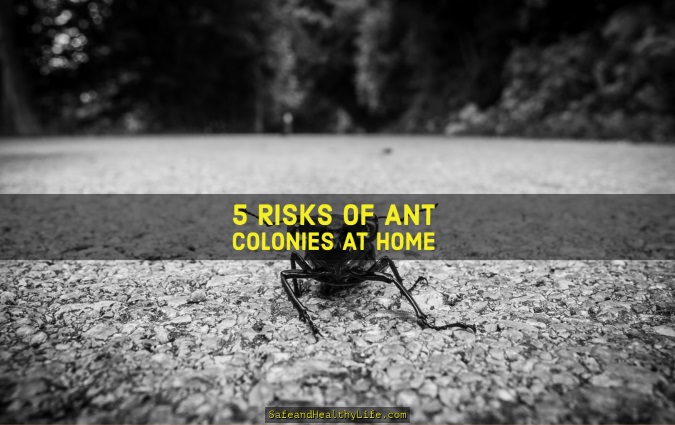
Ant colonies are physical structures that are also cooperative organizations, and many ant colonies teem with thousands of hardworking insects.
Although these colonies are fascinating, most homeowners don’t want ant colonies on or near their properties. Ant colonies can wreak havoc on homes, harm human health, and damage surrounding land.
Once you learn about a few risks of ant colonies at home, plus some tips on how to eliminate the threats, you’ll have greater peace of mind.
Ant Colonies May Cause Structural Damage
Ants come in many species, including harvester ants, carpenter ants, and field ants, and ant colonies do have the capacity to cause structural damage.
For example, carpenter ants love to nest, and they often carve out tunnels in aging wood to create their nests.
Unfortunately, this poses a threat by weakening already damaged wood. When wood is hollowed out by colonies of carpenter ants, the structural integrity of homes and other structures may suffer.
Homes are big investments, and so are other wooden structures, such as sheds. When ant colonies are present, it’s difficult to protect a home investment.
Weakened wood due to ant infestation may be dangerous, as structural weaknesses in wood may cause beams or other load-bearing elements to fail.
1. Ants Colonies May Harm Human Health
Ant colonies full of six-legged and social creatures are invaluable to ecosystems, but they aren’t always healthy for human beings.
These tiny insects may carry and spread germs, including Salmonella bacteria. Ants have also been known to carry and spread serious infections and diseases, including dysentery and smallpox.
While Ants can bite human beings, they don’t spread bacteria, infections, and diseases that way. Instead, they crawl around in structures, looking for sustenance.
When they are in transit, they come into contact with germs and other things that have the potential to harm human health. As they keep moving, they spread those germs to other parts of a home.
2. Ant Colonies May Damage Landscaping
As if the risk of structural damage and health problems aren’t enough, ant colonies also can ruin the look of home landscaping.
Homeowners who spend time keeping their lawns fresh, green, and manicured may dread the sight of colonies of ants, who build hills that leave unattractive mounds.
As ants create pathways within the root systems of grass, they damage that grass, and may even damage lawnmowers. Some ants also farm other insects, by assisting them with survival. This may lead to other insect problems.
3. Ants Make Their Nests inside Your Home
They usually signal a young monarch to come and build a nest closer to the food when ants discover an especially good food source.
You could have a full-blown hive of ants hiding within your kitchen before you know it. As these are new queens and their mates on the look-out for a new home, keep an eye on flying ants.
Look out for scattered wings as well, as this suggests that the ants have found a spot to settle in and don’t have to travel around looking for a new home anymore.
If the ant nest is tiny, by putting a container filled with some wool or straw on the nest and then flipping the container now filled with the nest into a large room, such as your garden or a grass field, you may physically extract the ant nest from your premises.
4. Ants Can Contaminate Your Food
Not only are ants nuisance bugs that can be a detriment to you and your pets, but they can also create a health danger by contaminating your food.
They gather up and bring bacteria that can be passed along to your food and kitchenware as ants travel around your house.
While there is a very low chance of acquiring these germs from food contamination by ants, it is always important to note that it is conceivable and that you should take precautions to keep your food safe.
Storing the food in enclosed containers that cannot be accessed by ants is the first step to avoiding food contamination. Continue to collect food crumbs to keep the kitchen clean.
5. Tips for Homeowners to Get Rid of Ants
Ant colonies thrive as the product of millions of years of evolution, so homeowners need help to effectively eradicate them.
To prevent ants from infesting and causing issues inside your home, there are a few steps you can take. One of the most critical steps is to ensure that surfaces are neat and clean inside and outside your home.
Contacting a pest control company is the best way to ensure the safe removal of these insects. A pest control technician knows sensible ways to get rid of ant colonies. Solutions may include sprays, traps, and foggers.
Foggers are used to fumigate an area for long-lasting results. Since ants often lurk in areas that are hard to get at, including crawlspace, professional help is strongly recommended.
Home Remedies
Ants have a good sense of smell that can control their behavior and how they communicate with one another. So, as an attractant, you might mix baking soda with sugar and place it near the nests of the ants in your house.
Generally, after eating this, the ants die and what you need to do then is run the vacuum cleaner to get rid of the residue.
To discourage ants from entering and constructing nests, make sure to check for any gaps and crevices on windows, doors, and walls in your home and block them using sticky blocks, or even chalk.
You can also replace your coins with copper coins in your piggy bank or near to it to stop them from spreading.
The sooner a homeowner has ant colonies removed from their property, the better.
About The Author:
My name is Wahab. My interest is sharing different ideas and tips. I like to share ideas and as a result, I would be delighted to hear from you.




